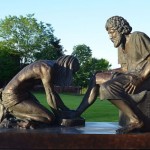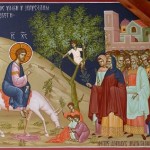 1 Timothy 3:14-4:5
1 Timothy 3:14-4:5
In I Timothy 3:14-4:5, St. Paul teaches what is called a sacramental worldview. According to the Book of Common Prayer, a sacrament is “an outward and visible sign of an inward and spiritual grace given unto us.” There are two dominical Sacraments, those Jesus Christ Himself specifically ordained: Baptism and Holy Communion. In some way, things such as ordination, confirmation, and unction for healing are also sacraments in that God gives His grace at such times, at which time there is an outward sign of the spiritual grace that God gives.
In an even more general sense, the entire world is a sacrament of God because God is present in the world and speaks through it. “The heavens declare the glory of God, and the firmament shows his handiwork. There is no speech or language where their voice is not heard” (Psalm 19: 1,3.) “For since the creation of the world His invisible attributes are clearly seen, being understood by the things that are made, even His eternal power and Godhead” (Romans1:20.)
Therefore, just as Einstein had two theories of relativity, I have two theories of sacramentality.
Erlandson’s Special Theory of Sacramentality states that God’s grace is communicated through and visibly signified by His special Sacraments of Baptism and Communion, if faithfully received.
Erlandson’s General Theory of Sacramentality states that God’s grace is generally communicated through and visibly signified by His all of His creation, if faithfully received.
Now what in the world does this have to do with I Timothy 3 and 4? I had a feeling you might ask. The sacramental worldview is right here in Paul’s apostolic teaching in I Timothy, especially in verse 3:15and 4:4-5. In 3:15Paul says something that will confuse and surprise us, so much so that we often don’t even see it when it’s right before our eyes. What does Paul say? He says that he is writing so that people will know how to conduct themselves in the house of God, the Church, which is the pillar and ground of the truth.
Am I sure I’m reading that right? Yes! Though we might expect God to say, through Paul, that He or the Bible is the pillar and ground of the truth, what Paul in fact says is that the Church is the pillar and ground of the truth. If we miss the importance of the Church to the apostles and their teaching and we miss the importance of the Church in God’s coming to men, then we have missed the point of almost all of the New Testament. In the book of Acts, St. Luke makes it clear that what Jesus began both to do and to teach, the Church is to continue, under the inspiration and guidance of the Holy Spirit.
For this reason, it has been said that the Church is the extension of the Incarnation. The entire Church, therefore, is really the Sacrament of God because it is through us that God and His grace is mediated to the world. For this reason, all of Paul’s letters are full of instructions to the churches and their leaders, and they assume the Church as a whole is a visible, physical presence on earth and a means of His grace to the world. Once we understand this, we can understand how I can say that the Church is a sacrament in a sense.
At the time Paul was writing, there was no New Testament Bible. Various of the books of the New Testament had been written, but as a whole the New Testament was taking shape, and it took shape in the context of the Church that Jesus Christ had already established and entrusted to His apostles. We find that the apostolic teaching or deposit of whichSt. Paulspeaks so frequently in the “trustworthy” sayings that Paul probably inherited from the other apostles. We find it in 1 Timothy3:16(which is even more important but less famous than 2 Timothy3:16), where Paul is passing on the apostolic teaching of the Church which he himself had received by word of mouth from the other apostles. We see it in Paul’s hymns as well, such as the one in 1 Timothy 1:17.
Paul understood the Church to be sacramental, God’s visible means of grace, because he knew that Jesus had ordained apostles such as himself to teach and lead the Body of Christ. The apostles then ordained specific leaders such as Timothy, who then ordained other leaders – bishops, presbyters, and deacons. Each of these ordained leaders vowed to pass on the apostolic teaching they had received and to guard them with their lives.
It was in this context of the visible Church with God-ordained leaders that the New Testament Scriptures were written and canonized (recognized as Scripture), and in which they have always been interpreted.
Paul’s teaching on the sacramental worldview is also present in Chapter 4, verses 3-4 where Paul teaches that “every creature of God is good, and nothing is to be refused if it is received with thanksgiving, for it is sanctified by the word of God and prayer.” We know that everything God created, He created good. But sometimes we are so colored by our own sin and the fallenness of the world, that we forget God’s original intention. We forget, as well, that Jesus Christ came to redeem the entire cosmos, not just a few souls. What God created good and man ruined, God has redeemed for those who love Him.
How can we be sure that the fallen creatures of God are good for us? We accept God’s good gifts in three ways by which they are sanctified. Obviously, they are sanctified only by the redeeming work of Jesus Christ, but how does He communicate their redemption to us? First, by thanksgiving. We are privileged to be able to partake of God’s good gifts again if we receive them with thanksgiving, acknowledging that they come from God and that God has made them clean again.
It was for this reason, for the purpose of redeeming the good gifts He had created, that Jesus declared all food clean (Mark 7:19) and that Peter had his vision that it was O.K. to eat pork. But they are only made clean if received with thanksgiving. That is why there is a long tradition of praying before meals.
Thanksgiving is so essential to receiving God’s good gifts that the most common name in the early Church for the Holy Communion or Lord’s Supper (or Sacrament) was the Eucharist, which is a Greek word for “thanksgiving.” After Paul has taught in Romans 1:20 that the creation speaks of God and is therefore a means of receiving Him, he says that one of the reasons mankind is condemned is because though they know God through His creation, they did not glorify Him or give thanks (eucharisto.)
With thanksgiving and with the Word of God and prayer, God’s creation is sanctified for us once again and becomes a lesser kind of sacrament, a visible sign of God’s grace and goodness to us.
We might, finally, summarize the sacramental worldview ofSt. Pauland the early church in this way: Receiving God’s goodness and grace through Christ in the world, men are to respond with a life of thanksgiving, the Word, and prayer in His Church.
How blessed, to be able to see God and participate in His life through every possible means He has given us!
Prayer: Father, thank you for every good gift that You have given me in this life. I thank You for Your presence through Your Son and by Your Spirit. I thank You for the Sacraments you have commanded through Your Son, as well as for the ways You bless me through Your people and through Your creation. Father, sanctify each of your gifts to me by making me truly thankful as I faithfully hear Your Word and spend time in Your presence in prayer. Amen.
Points for Meditation:
- How has God come to you through His Church? Give some thought to how your life with God has been mediated through His people.
- Find 3 ways to practice giving thanks to God today: through prayer, song, making lists (this could be general categories of things to thank Him for or it could be specific lists under one category, such as thanking Him for particular people or particular foods.)
- Find three creative ways to remember God’s presence and goodness through the things He has created.
Resolution: I resolve today to meditate on God’s goodness to me and how He comes to me through the life He has given me today, not only in His Word and in prayer, but through His people and His creation. I further resolve to pay attention to His gifts and to give thanks throughout the day.
© 2011 Fr. Charles Erlandson
CC Image courtesy of Librarian by khrawlings on Flickr.jpg










